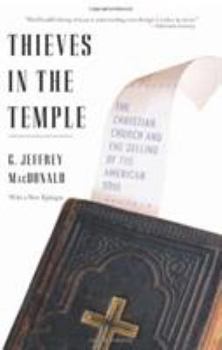Thieves in the Temple: The Christian Church and the Selling of the American Soul
Select Format
Select Condition 
Book Overview
What has become of the Christian Church? Once devoted to molding Americans into better people, in recent years the Christian Church has gotten a corporate makeover. In a desperate attempt to bolster... This description may be from another edition of this product.
Format:Paperback
Language:English
ISBN:0465063772
ISBN13:9780465063772
Release Date:April 2013
Publisher:Basic Books (AZ)
Length:240 Pages
Weight:0.60 lbs.
Dimensions:0.8" x 5.5" x 8.2"
Age Range:18 years and up
Grade Range:Postsecondary and higher
Customer Reviews
1 rating
Marketing the Mystery: Capitalism Comes to Church
Published by Thriftbooks.com User , 14 years ago
As the editor of an explicitly Christian periodical, I am usually wary of books that arrive on my desk from secular publishing houses. More often than not, the titles they want us to review are "Christian" in name only, using the religious angle as a veneer for social and political issues. Such books are, at best, useless and, at worst, deliberately destabilizing to the faith. Every once in a while, however, something worthwhile slips through. Thieves in the Temple is the most recent such gem. With measured candor, MacDonald (a freelance journalist and United Church of Christ clergyman) addresses the decline of moral and spiritual authority in today's American Church, tracing it to the Church's embrace of the wider culture's creeds of consumerism, individualism, victimhood, and passivity. MacDonald examines and deconstructs the consumer culture of the Church and exposes it for the pile of dry bones it is. He reminds pastors of their responsibility, not to be "relevant" or accommodating, but to be challenging to churchgoers. Christian leaders, he says, should be leading, not entertaining or offering therapy. Appealing to Christ's thoroughly counter-cultural ministry, he urges readers not to conform to the world (or even to be only superficially "different"), but to be sacrificial, disciplined, and committed to a higher road where self is denied more often than indulged. MacDonald openly wonders what will become of the Church in this country when the consumerist juggernaut finally grinds to a halt leaving a bankrupt shell of belief in its wake. The book is not without some significant flaws. MacDonald's reasoning at times seems to indicate that he doesn't fully understand the deity of Christ. Other times, his wording and choice of examples exposes a politically liberal undercurrent to his views, and he over-generalizes the very diverse array of church traditions within evangelical Protestantism. He tends to describe developing and maintaining a moral fiber in society as the primary function of the Church rather than as side effects of its fundamentally spiritual reality, and his solutions to the problems he describes depend more on human effort than divine intervention. Still, Thieves hits close enough to the mark that, as I was reading, the Lord moved me to put it aside and repent of the myriad ways I exalt my own comfort over His glory each day. I suppose in that sense, the strongest critique I could offer of this book is that it had to come from the mainstream. It is to our shame that Christian publishers (who, unfortunately, can be near the heart of the problems MacDonald engages) have not found a book like this worth printing.






